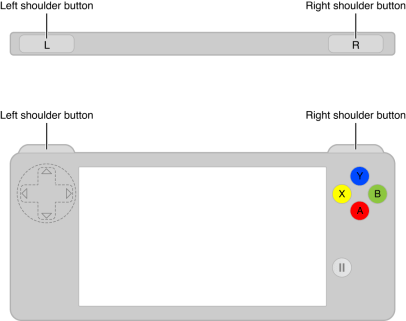Apple’s developer bits are generally the bigger picture story that comes out of WWDC, and some details are slowly emerging about those 1,500 or so new APIs Apple has added for devs to take advantage of. Some of the better news is around new gaming technologies, which should result in much improved experiences for both gamers and the people creating the games they play.
iOS 7 will introduce support for “Made for iPhone, iPod and iPad” (MFi) program-compatible game controller hardware (via 9to5Mac), which means developers will finally be able to access system-level tools for building in support for a wide range of devices from accessory manufacturers. The new API supports both controller sheaths that hold the iPhone or device itself, and standalone controllers that would more closely resemble your traditional gamepad.
New images found by Touch Arcade from the iOS 7 developer’s guide shows that controllers will be able to offer support for configurations of two joysticks, a directional pad, and up to six buttons at least, so that it should be able to replicate the setup of traditional controllers like the PlayStation DualShock or Super Nintendo gamepad pretty easily. For retro titles and core games alike, this should be a tremendous addition to the arsenal, and you can expect third-party hardware accessory makers like Griffin, Belkin, etc., as well as startups on Kickstarter, to be all over this. There are third-party controllers already out there, but they’ve always required devs to integrate an external SDK to get games working with them, that’s not going to be the case anymore.
Retro games should also get a nice boost from SpriteKit, Apple’s new framework for developing more simple, 2D style games and creating interesting physics effects like the one shown in the video below. Sprite Kit looks to be pretty powerful, but has the disadvantage of not reaching outside of Apple’s ecosystem, or of supporting older devices. Still, Apple has a very fast-adopting user base for new versions of iOS, and there are a lot of dev shops that focus only on iOS, so we could see some very cool stuff built with this new, simpler Unity-type engine on Apple’s devices.
Other new gaming features include turn-based multiplayer game modes, ladder rankings for high score leaderboards and more. But the game controller element alone could have a huge impact on iOS and its role in the mobile gaming market, and it’s quite likely that Nintendo and Sony should be watching very closely to see how the ecosystem around that feature develops.
